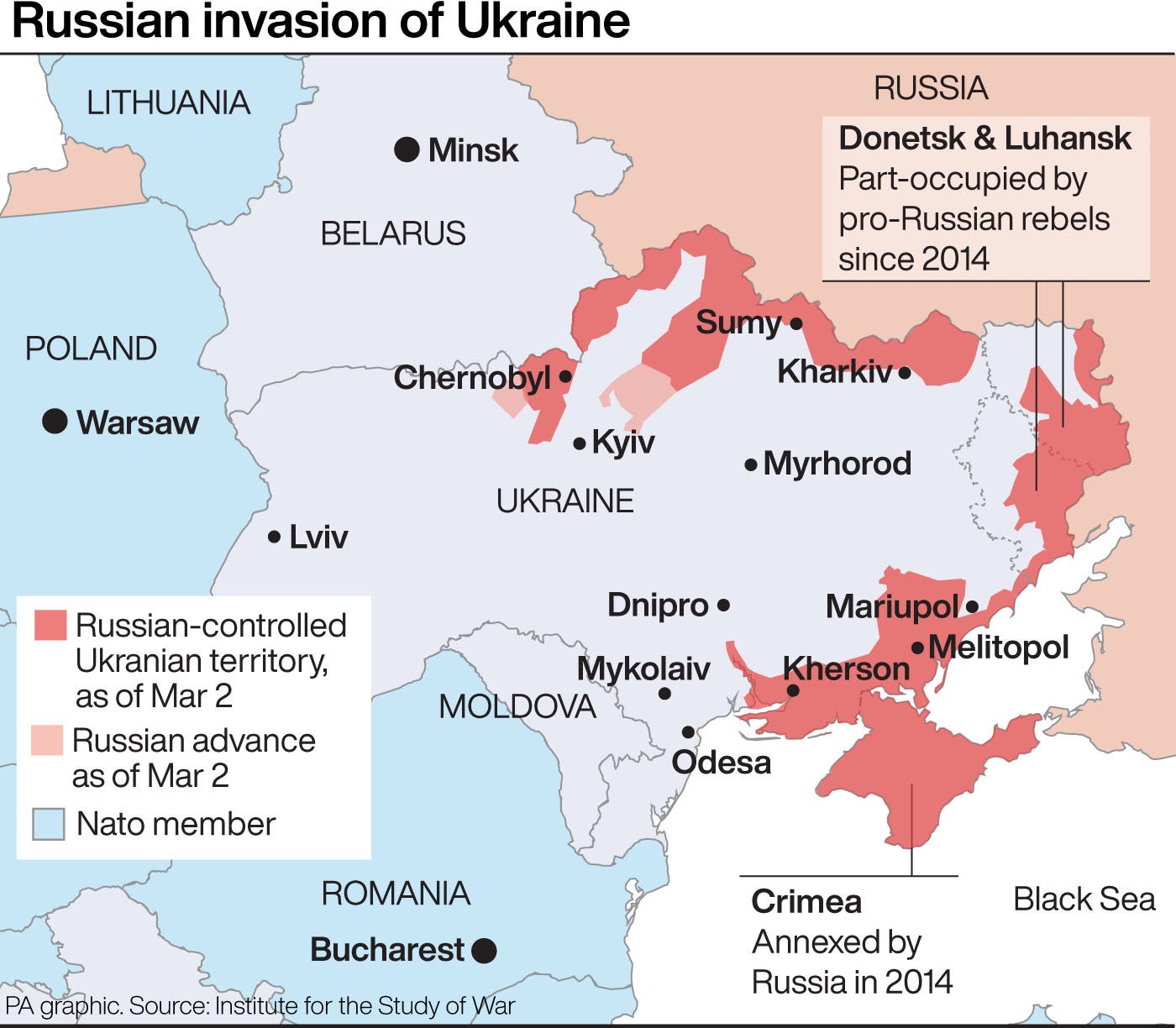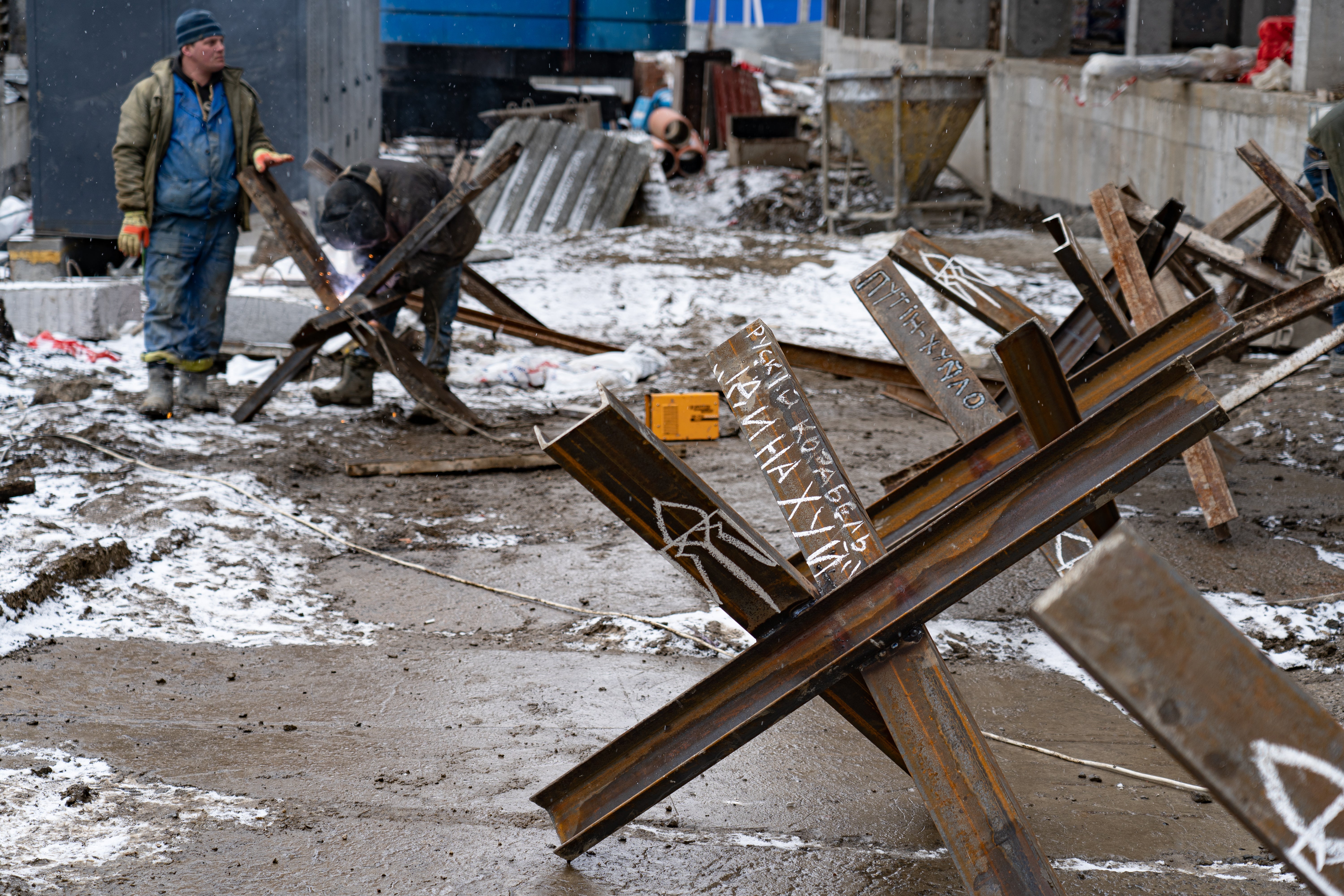
A DJ who usually spends his days organising raves is now brewing Molotov cocktails. A construction foreman is welding anti-tank obstacles. A software developer who fled his home and has been separated from his family is making military camouflage netting.
Since Russia invaded Ukraine a week ago, launching one of the largest ground conflicts in Europe since the Second World War, ordinary Ukrainians across the country have come together to assist the war effort in various ways.
Many Ukrainian citizens – mainly young men – have volunteered to join the army and fight as Russian forces intensify their attacks on major cities, having claimed control of the port of Kherson while continuing to besiege Mariupol on Thursday.

Meanwhile, there are countless other civilians who have decided to join a different kind of army: a battalion of volunteers who are making supplies to send to the front.
In the western city of Lviv, near to the main crossing point for Ukrainians trying to flee to Poland, Sergei is making camouflage nets and managing blood donations for soldiers at a community centre turned military factory.
The 31-year-old software developer endured a harrowing two-day journey to escape the bombardment of Kyiv, before going to the border with Poland to get his wife and child to safety.
The United Nations says that at least a million people have been forced to flee Ukraine, and that as many as five times that number could become refugees if the fighting continues.
However, Sergei was unable to cross the border with his family as Ukrainian president Volodymyr Zelensky ruled that all men of fighting age cannot leave the country.

Rather than “sitting rotting in a bunker” and waiting out the war away from his family, Sergei says he lacked the training to fight but was determined to contribute to the war effort.
“We are tied together in this nightmare, and determined to fight for our home and homeland,” he tells The Independent.
“We feel very united. Before, I didn’t think there was this level of support amongst people in Ukraine, we were fractured,” he adds. “But this one huge problem has brought us together.”
Around him is a hive of activity. Hundreds of people – from grandmothers local to Lviv to families who fled ferocious shelling in the east – have gathered to make masking nets to cover tanks and even trenches.
Just being here helps me with my fears for my country
Bags of cut-up khaki, black and brown hoodies, dress shirts, and camouflage T-shirts provided by the community lay in piles on the ground.
Local carpenters have fashioned wooden frames to hang donated fishing nets, to which volunteers such as Sergei and Irina are attaching the crude pieces of fabric.
“The first day I just scrolled through the news on my phone panicking about what was happening everywhere,” says 25-year-old Irina, who is coordinating the community effort and whose family is trapped in Kyiv.
“We have everyone here from mothers to grandmothers helping,” she adds.

In another part of Lviv, local youths have teamed up with breweries and alcohol factories and are busy making Molotov cocktails with beer and wine bottles.
Heletron, who asked to be identified only by his DJ name, now drives around the city delivering aluminium powder, petrol and white spirit – ingredients for the makeshift firebombs – from the boot of his battered car.
“From the second the war broke out, I needed to find a job for myself. I have a car and we needed supplies. The third day of the war, I started making Molotovs,” said the balaclava-clad 27-year-old.
“Today we are sending them to the frontline in Kyiv.”

Volunteers are also busy over 200km east in Khmelnytskyi, a major central hub as it lies at the crossroads between Kyiv, Odesa on the coast and western cities like Lviv.
Across the riverside city, civilians have sprayed graffiti on billboards reading “Russians, there is no vodka – go home” and “Glory to Ukraine, glory to heroes”. By heavily defended checkpoints, they have posted images of president Vladimir Putin defaced with red crosses.
Construction workers have stopped building apartment blocks and are instead welding anti-tank obstacles like makeshift tyre spike strips and so-called Czech hedgehogs.

Foreman Serhiy, 40, and his team of half-a-dozen workmen have made dozens of tyre spikes and at least 23 Czech hedgehogs since the war erupted seven days ago.
They have used white paint to adorn their handiwork with the words “Russian ships. Go f*** yourself”, now a rallying cry across the country that references the purported last stand of 13 Ukrainian soldiers stuck on a Snake Island who refused to surrender to a Russian warship.
“I do plan to join the armed forces but since I’ve never carried a weapon in my life, I am using the tools and equipment I have to do whatever I can right now,” Sergei says as they load the Czech hedgehogs onto a truck to deliver to the front line.

“At the moment there is a 24-hour queue for conscription to the army,” he tells The Independent. “I don’t just want to sit in line. I want to work so I am doing this now.”
Back in the community centre in Lviv, more and more people turn up every minute to join in and support the war effort.
“We are actually turning away volunteers at this point because we have so much support,” Irina says, talking to her team about making medical supplies for the soldiers on the front lines.
“Just being here helps me with my fears for my country,” she adds. “I feel that I am strong and independent and that everything will ultimately be fine. We believe in our army and believe in Ukraine.”
The Independent has a proud history of campaigning for the rights of the most vulnerable, and we first ran our Refugees Welcome campaign during the war in Syria in 2015. Now, as we renew our campaign and launch this petition in the wake of the unfolding Ukrainian crisis, we are calling on the government to go further and faster to ensure help is delivered. To find out more about our Refugees Welcome campaign, click here. To sign the petition click here. If you would like to donate then please click here for our GoFundMe page.







